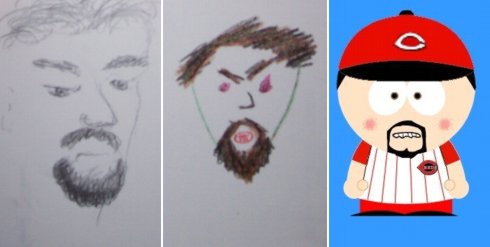Study Shows Looks Speak Louder Than Actions
CLEVELAND, OH -- Redheads are hot-tempered. Nerds wear glasses. Characterizing people by their looks is nothing new. But according to a study out of Case Western Reserve University, such characterizations reach beyond our intellectual understanding of events all the way down to our beliefs about good and evil.
The study asked 500 men to draw a picture of a good man and describe that man.

Certain characteristics were common to all of the drawings: curly, mussed blond hair, and a devil-may-care expression. Participants described the good man as strong, entitled, and forthright.
The study then asked the same 500 men to draw a picture of an evil man and describe him.

Common characteristics included dark hair and a goatee. Participants described the evil man as overbearing, indulged, and rude.
The second phase of the study divided the 500 men into two groups and read them the following scenario:
“Joe goes to a restaurant and orders a T-bone steak, well-done. When a sirloin steak, cooked medium-rare arrives at his table, Joe sends the steak back, asking for the order to be corrected.”
Group A was shown a picture of Joe that looked like the prototypical Good Man, while Group B was shown a picture that looked like the Evil Man. Both groups were asked their impressions on the story.
Group A, who had seen Good Joe, thought Joe had been badly mistreated and worried that he might suffer from indigestion or not want to return to the restaurant. Some thought the restaurant should give him gift certificates to tie him up as a long-term customer.
Group B, who had been shown Bad Joe, thought Joe shouldn't have complained about the mix-up but just eaten what he was given because he'd ordered a better meal than he deserved. Some blamed him for depriving someone else of the sirloin. Most hoped he would not return to the restaurant. One continually shouted, “Stop the bad man!”
“The implications are stunning,” said Dr. Frank O. Fill, head psychology researcher on the project. “We've always known that stereotypes are powerful, but to think that what you do doesn't matter at all because people will interpret your actions in a way that is consistent with their preconceived notions…” Dr. Fill trailed off.
“I'm just glad I'm not dark-haired,” said the strawberry blond Fill. “Now get out of my office. I have work to do.”
Dr. Fill plans more studies in the coming months, including determining the perception of short, round Puerto Rican men.


